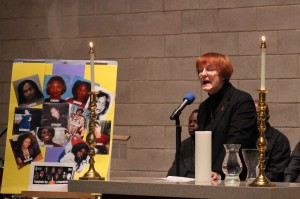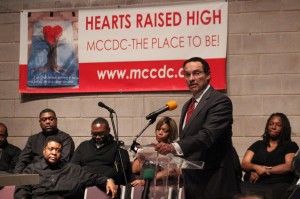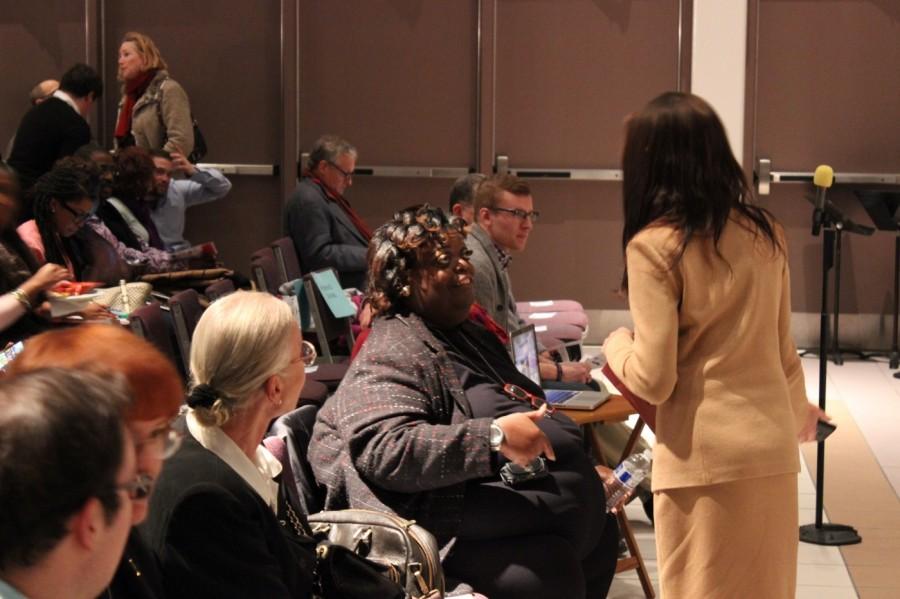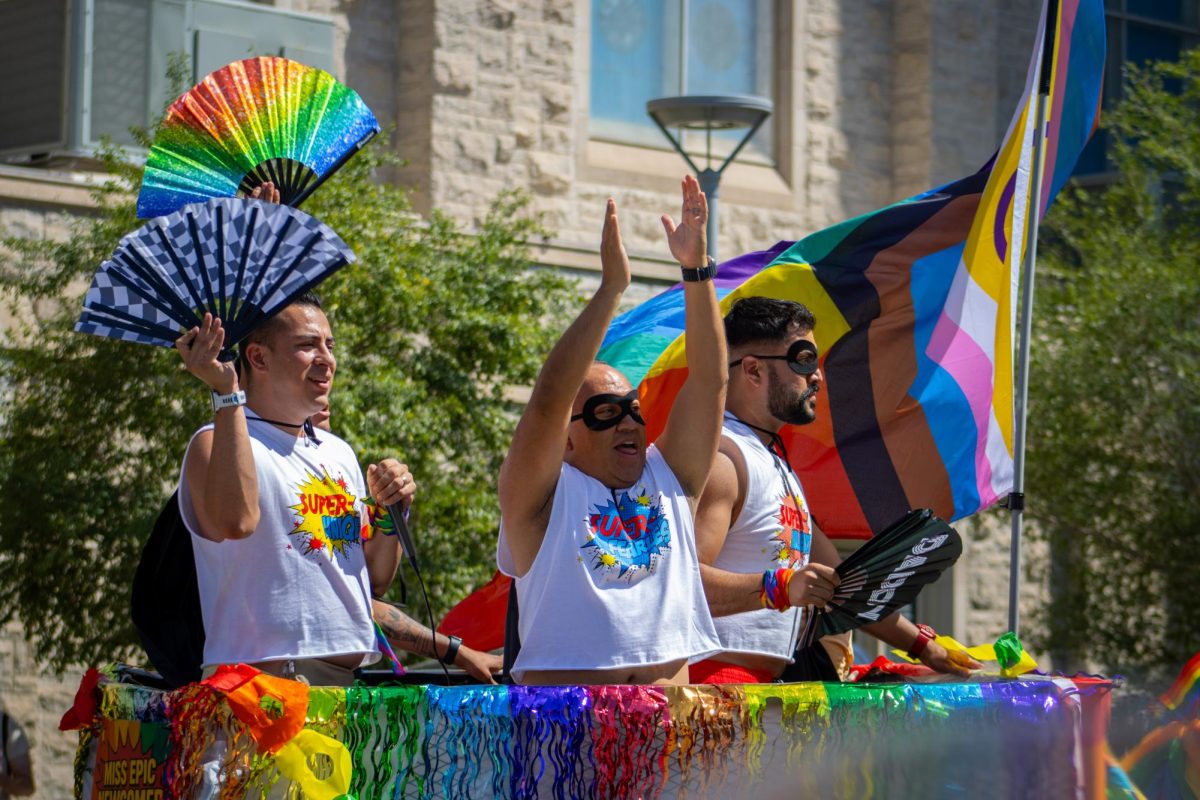WASHINGTON – Earline Budd came out as transgender to her Baptist family when she was a 9-year-old boy.
Like many transgender women, the Washington native was in for a rough time. Her family didn’t accept her, and she said it was a traumatic experience.
The transgender community faces a number of challenges. In most states there are few legal protections afforded to people who are trans, and they frequently have to live with discrimination. High rates of violence against the community led to the creation of awareness events such as the Transgender Day of Remembrance, which memorializes victims of hate crimes.
By age 14, Budd was secretly living as a woman, and her family kicked her out. She ended up at a juvenile detention center after committing a minor crime.
By age 17, she was homeless. She worked the streets and became addicted to drugs. She was diagnosed with HIV, the virus that causes AIDS.
“I was forced out into the world of survival,” she said. “I’m not afraid to ever say that, yes, substance abuse, doing commercial sex work, which is prostitution … and being homeless is a part of my history.”
But Budd, 56, was also lucky.
She found mentors and formed her own family made up of the lesbian, gay, bisexual and transgender activists she met while working on the streets.
“I believe that in life, when I was younger, I probably did all the things that one could do to get HIV,” she said. “I’ve been blessed today to be here to be able to help folks.”

Jessica Xavier prepares to light the candle of life during Thursday’s Transgender Day of Remembrance event.
Budd blossomed into an activist herself and later became one of the founders of the District’s Transgender Health Empowerment organization, which is now closed, and was appointed to the District’s Human Rights Commission.
“I think that because of my rich history in terms of my experiences, it has afforded me the ability to be the best that I can be in terms of helping other people,” she said.
Budd now works from an office at HIPS (Helping Individual People Survive) and spends busy days counseling clients and setting them up with emergency housing and medical services. Many people who go to HIPS, a resource for homeless people and sex workers, to get help are transgender women.
Debbie McMillan, harm reduction services manager for HIPS, said it is helpful that the organization has transgender people doing outreach.
“I remember very early that these types of resources wasn’t available, and it definitely wasn’t nobody that looked like me representing an agency saying that ‘I want to help you,’” she said.
McMillan was raised in Washington and said she started out as a HIPS client and worked her way up to management.
She said she was a sex worker and a drug user when she was young, working at 5th and K streets NW, a location once notorious for transgender sex workers.
“When I got clean, I started to work with HIPS in a peer-education capacity,” she said.
At the time she was in beauty school practicing for her license, but she ended up working in HIV advocacy and making a difference in her community.
“There was a shift,” she said. “I became very passionate about women like me.”
McMillan said the biggest problem the transgender community faces is a lack of cultural competency.
“I have people say, ‘Oh my god, I’ve never been around a transgender,’” she said.
When she first meets people, she said they go from thinking all transgender people are a certain way to telling her she’s “cool.”
“A lot of times, people see transgender women or individuals from the LGBT population as sub-human, and that’s where the treatment comes from,” she said. “People need to understand that we’re human, and we’re a part of this community, and we’re here to stay.”
There has been evolution on the issue over the years, McMillan said.
“When I began to make my transition, it wasn’t a word, you know. It was some derogatory terms used to identify women who were born male but identified as women,” she said. “Transgender is a beautiful name compared to what I’m used to when I started this process.”

D.C. Mayor Vincent Gray speaks at the Transgender Day of Remembrance Thursday at the Metropolitan Community Church of Washington D.C. During his term, Gray expanded health-care services and legal protections for the trans community.
But there is still a lot of work to do, McMillan said. Until the government and law enforcement officials set an example and start to care about protecting transgender people, the community will continue to be marginalized and endangered.
That’s one reason Budd has been coordinating the District’s Transgender Day of Remembrance memorials for about five years.
Budd said more than 200 cities around the world observe Nov. 20 as Transgender Day of Remembrance, which raises awareness for people who were killed because they were transgender or gender non-conforming.
“It’s gotten bigger and better,” Budd said, adding that the event draws in crowds of about 300 people. “This year looks to be very exciting.”
Transgender Day of Remembrance, or TDOR for short, was started by Gwendolyn Ann Smith, an activist in San Francisco, in 1999 after the brutal, unsolved murder of transgender woman Rita Hester in Allston, Mass., the previous year.
Memorials typically include a reading of the names of people who have been killed in anti-transgender attacks. A list for this year on Smith’s original TDOR website includes the names of 236 individuals from around the world, as curated by Marti Abernathey, 47, of Madison, Wis.
As the founder of the Transadvocate blog, Abernathey knew she had the skills to do it, and she knew it needed to be done.
“The most important thing, for me, is to put the information out there,” she said. “These people were murdered simply because they were living their truth.”
People like 22-year-old Brittany Stergis, who on Dec. 5 was shot in the head and became the third transgender woman killed in Cleveland last year. The previous day another trans woman, Betty Skinner, 52, was found beaten to death in her senior living apartment, and earlier in the year, 20-year-old CeCe Dove was murdered.
While it’s true that Ohio is one of the least transgender-friendly states in the U.S. – the state has no legal protections for people who are transgender – anti-trans crimes happen even in the most progressive parts of the country.
In Los Angeles, Aniya Parker was killed at the beginning of October. The 47-year-old woman was surrounded and attacked. As she tried to run away, she was shot in the head.
States were rated on legal protections for transgender people in hate crime laws, non-discrimination laws, anti-bullying laws for students and allowing transgender people to change their birth certificates. Few states provided no legal protections for trans people at all, and many states only provided trans people the option of amending their birth certificates after sex reassignment surgery. A handful of states afforded the transgender communities legal protections in all four areas.
Yet accurate data about crimes against the transgender community can be hard to collect, because cases are often misreported or neglected. And activists and law enforcement officials have a tendency to disagree about whether a killing is a hate crime.
“It’s not cut and dry,” Abernathey said. But “the murders that happen, typically they all have a common theme.”
Abernathey scours international news media for accounts of violence against trans people. She said that all of the cases she puts on the TDOR site show contempt or disregard for the bodies or personhood of transgender people.
For example, one name on Abernathey’s list is bar owner Mary Joy Añonuevo, 55, who was found dead last month in her bar in Lucena, Phillipines. Añonuevo was stabbed 33 times.
“When someone is stabbed 33 times, they’re probably not being robbed,” Abernathey said. “How do you not say that it is a hate crime?”
The National Coalition for Anti-violence Programs collects data on likely hate crimes from affiliated programs throughout the U.S. In 2013, the group reported 2,001 attacks and 18 homicides in the U.S. rooted in hate for the LGBT community.
Almost three-quarters of homicide victims were transgender women, and 67 percent were transgender women of color, according to the report.
The FBI also collects data on hate crimes as part of its uniform crime reports, and the statistics will include data on transgender individuals for the first time when the 2013 hate crime report is released in December. But the FBI doesn’t analyze trends about hate crimes, and the data used in its reports is given to the FBI on a voluntary basis by individual law enforcement organizations.
In many states, hate crime laws do not include bias against transgender people.
See the interactive graphic at shfwire.com.
Wesley Juhl is a senior at the University of Nevada-Las Vegas, where he studies journalism, literature and creative writing. He is currently participating in the Scripps Howard Foundation Semester in Washington Program. He may be reached at [email protected].













